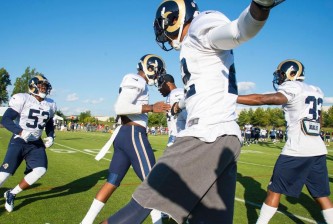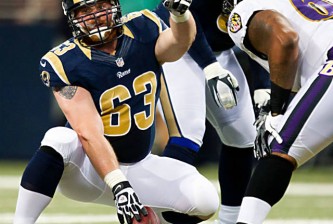
One year after this seminal book came out, Adrian Peterson signed the richest contract ever given to an NFL running back — before playing a single down.
AP: All some people see is, ‘Oh, we’re not going to be around football.’ But how the players look at it … the players are getting robbed. They are. The owners are making so much money off of us to begin with. I don’t know that I want to quote myself on that…
SC: It’s nothing that I haven’t heard from other players, believe me.
AP: It’s modern-day slavery, you know? People kind of laugh at that, but there are people working at regular jobs who get treated the same way, too.
— Shutdown Corner: “Adrian Peterson expresses frustration on labor issues“
As sports fans we talk a lot about “players” and “owners” … and if the boom of fantasy sports is any indication, we all want to be “owners.” But the terms are horribly misleading, especially in context of highly successful professional sports. Adrian Peterson — his body, his family, his existance as a human — isn’t owned by Zygi Wilf and the Vikings any more than my family and I are owned by the good folks at Bloguin. We’re under contract.
There are differences between my contract and his — if I wasn’t writing for Bloguin I could go and write for one of a few dozen other networks or websites, assuming they liked my stuff. There aren’t many alternatives to the NFL. But that exclusivity carries with it a pretty exclusive pay scale — his current contract is worth approximately 400 thousand times what mine is worth.
You could make an argument that Peterson is referring to a concept of “wage slavery” — that his very livelihood depends on his making a living wage, and the more control and exclusivity his bosses have over the size and availability of that wage, the more the situation approaches something like slavery.
But therein lies the fault of the language. Slavery isn’t a concept that exists by degrees. Either you are enslaved or you are free. We need a better metaphor. But instead, we fall back on the concepts that we’re used to, and give in to the temptation to compare ourselves to some historical precedent — especially those at the extreme end of the scale — when we’re under duress.
Witness all the media coverage over the past few weeks that have posed this lockout scenario as a “disaster” — perhaps “the biggest disaster ever,” as the Hollywood Reporter suggests; or talked about the NFLPA’s ability to decertify as their “nuclear option,” as does the Wall Street Journal; or talk about a “seismic shift in thinking” required to end the lockout, as did the New York Post. All metaphors that suddenly fall awful flat in comparison with the real events happening in Japan.
At some point we as writers or speakers — especially those with a large platform — need to realize the limits of our words to connote the things we mean. And whenever possible, we need to expand our vocabularies or our phraseology to better express ourselves. Because as Peterson is sure to find, our words may outlive our intentions.
For his part, Doug Farrar, the man who interviewed Peterson for Yahoo’s Shutdown Corner, doesn’t think Peterson should be lambasted for his turn of phrase. <a href=”http://seahawks.sportspressnw.com/2011/03/16/live-chat-nfl-labor-and-lockout/“>He explained further in a chat session today</a>, in response to my question:
Adrian Peterson is getting a lot of flack for his “modern day slavery” comment in your interview, talking about the standoff between players and owners. Even reading in context of your full conversation, it still sounds pretty off base. Is there anything we’re missing as readers that you felt during the conversation?
Thanks for asking — I would like to address this again. Short version is that I believe Peterson is a really good guy who said a regrettable thing…
Long version is that I talked to him 15 minutes after the union decertified. Tempers were high, panic was high, and people were really, really, pissed off for a number of reasons. In that context, I believe what he was trying to say was that a.) the life of your average football player is nowhere near as problem-free as people imagine…
…and that b.) what the owners are asking the players to do, to basically take their revenue cut to pre-free agency levels, is exploitation.
Now, he’s not the first football player I’ve heard use that phrase. He’s just the first one to do it on the record. And other people have used the phrase. William C. Rhoden, the brilliant writer, penned a book called “Forty Million Dollar Slaves”. Curt Flood, who should have been in the Baseball Hall of Fame for the sacrifices he made in his career, has his life story told in a book called “A Well-Paid Slave”.
I don’t think Peterson meant to say it with that specific meaning. I think he meant to say that the players are being exploited, and people don’t understand that, and it’s very frustrating for him and many other players.
That’s why I tried so hard to add context to the quote. Because there’s a lot in there beyond the whole “money quote” aspect.






















